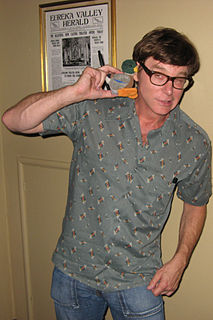A Quote by John Kricfalusi
From 20 years of experience hiring artists out of the schools, I know-they get worse every year. They're absolutely ridiculously retarded now.
Quote Topics
Related Quotes
Here's the positive scenario: that something has been going wrong in American society. You see it in wage growth, opioid abuse, many other social indicators, as you know. Sometimes it's better to get the bad reaction to that over with quickly while your civil society still is strong and you can react and respond and protest, and you know, four or eight years from now, make another decision, and maybe it's better to have that happen in 2017 than 20 years later when some of our problems are worse and our national mood is worse.
Coaches and players at the start must think their way through problems where a more experienced person would react out of habit and memory. One must not gain this experience, however, without being careful of empty redundancy. Do not fall into the error of the artist who boasts of 20 years of experience at his craft while, in fact, all he has had is one year - 20 times.
Things may not go to plan, but the unexpected throws up experiences and opportunities you had never dreamed of. I didn't get into Oxford the first time. I was absolutely heartbroken. Instead of going anywhere else I took a year out and reapplied. I wish I'd had some kind of framework for that year out, instead I worked in a Virgin Megastore. But looking back it taught me a lot, and meant my university experience was different, not worse. In the end, your grades aren't as important as the people you meet, and you can meet them anywhere.
The experience curve says that your costs should probably decline by 15% or 20% with every doubling in your experience making a product, approximately how many of them you turn out. It also says that if you have the biggest market share, meaning the most experience of anybody in your competitive set, you should have the lowest costs, and the resultant capability to underprice your competitors, maybe forever. The abiding lesson of the experience curve is that companies need to discipline themselves to keep reducing their costs, year in, year out, if they are to remain competitive.
I have great admiration and respect for the editors, writers, and artists of the comic books. They're turning out, I don't know, maybe 100 Batman stories a year, and the character turns 70 years old in May. It's incredible: for 70 years, on a weekly basis, every Wednesday, there is some Batman story coming out, if not a bunch of Batman stories coming out.
As the population is, in general, aging, there is more interest in what a 50-year-old, a 60-year-old, a 70-year-old, an 80-year-old is like. And one of the things that just naturally started to happen as I got older - and I could feel younger people looking up to me in a certain way and wanting to know things that I knew - I got interested in the women, in particular, who were 20 years older than me. Because I understand in a way that I didn't 20, 30 years ago, how much they know.
In youth we may have an absolutely new experience, subjective or objective, every hour of the day. Apprehension is vivid, retentiveness strong, and our recollections of that time, like those in a time spent in rapid and interesting travel, are of something intricate, multitudinous, and long-drawn-out. But as each passing year converts some of this experience into automatic routine which we hardly note at all, the days and the weeks smooth themselves out in recollection to a contentless unit, and the years grow hollow and collapse.
Everybody who know Rick Ross know that, for one, I love creating music, and one of the biggest impacts we have on the game was the fact that when we came into the game, artists was waiting two to three years to put out albums. I was one of the few that put out an album every year along with two or three mixtapes.








































